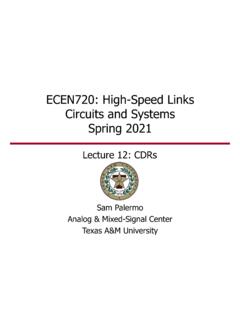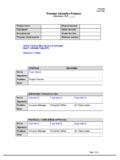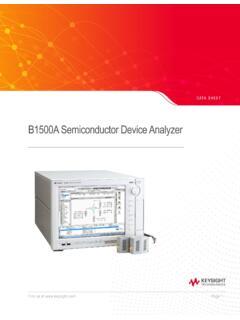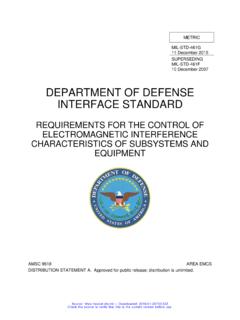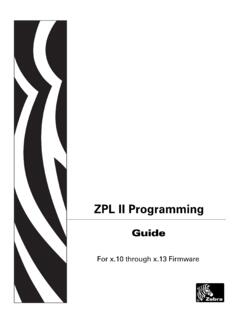Transcription of Method Validation and Verification - University of Utah
1 Method Validation and VerificationLauren N. Pearson, DO, MPHL aboratory Director, University of Utah Health Sciences Center Clinical Laboratories AUGUST 2020 ObjectivesIdentify the difference between Method Validation and Method verificationDescribe the studies required to document Method performanceInterpret Method performance data and statistical data outcomes2 Context and definitionsRegulatory requirementsStudies required for analytical Verification and analytical Validation Outline 3 Context and Definitions4 Validation versus VerificationValidation Establishing the performance specifications of a new diagnostic tool such as a new test, laboratory developed test or modified methodVerification A one-time process to determine performance characteristics of a test before use in patient testing5 Why Evaluate a Method ?
2 Document initial performance: Reference when troubleshooting problems Quality assurance -to ensure results Helpful for clinical consultations Meet regulatory requirements 6 Laboratory Regulations General and open to some interpretation Direct what must be done, not how it is Test Categorization Determined during FDA pre-market approval Waived testing Approved for home and point-of-care use Low risk of patient mismanagement if performed incorrectly Non-waived testing Moderate Complexity High Complexity LDTs Modified Tests 8 Accessed February 12, Requirements9 Waived TestsLabs have only 3 requirements! Pay biennial fee (every 2 years) for CLIA certificate renewal Follow manufacturers instructions for use Allow the laboratory to be inspected Generally, for cause (patient complaint) Random state survey Periodic inspections not required!
3 Note: No Method evaluation required10 Nonwaived Tests11 Method Validation to CLIAM oderate Complexity Precision Accuracy Reportable Range Reference Range Mnemonic: PARRHigh Complexity Precision Accuracy Reportable Range Reference Range(s) Analytical Sensitivity (LOD) Analytical Specificity Establish calibration and control procedures Other performance criteria12 Halling KC, Schrijver I, Persons DL. Test Verification and Validation for Molecular Diagnostic Assays. Arch Pathol Lab Med. 2012;136 JH. Verification of Method Performance for Clinical Laboratories . Advances in Clinical Chemistry. 2009;47 ModificationsAny change in the intended use or change to an assay that could affect performance: Different sample matrix (urine in a serum assay) Promoting different use (screen vs diagnosis) Type of analysis (qualitative vs quantitative) Incubation times and temperatures Sample or reagent dilution Using different calibration material or set-point Change or eliminating a procedural step13 Analytical Verification / Validation Laboratories are required to perform analytical Verification or Validation of each nonwaived test, Method , or instrument system before use in patient testing Regardless of when it was first introduced by the laboratory Includes instruments of the same make and model and temporary replacement (loaner)
4 Instruments There is no exception for analytical Verification or Validation of tests introduced prior to a specific date The laboratory must retain records as long as the Method is in use and for at least two years after discontinuation14 How to Meet the Regulations There is no one right way Consensus -CLSI protocols Literature -do what others have done Manufacturer s recommendations Balance between cost and what is reasonable15 Validation Studies16 AccuracyBias to a reference Method Absolute Relative17 Accuracy StudiesMethod comparison Carefully select reference Method Curate high quality samples with a range of analyte concentration Analyze >40 specimens by both test and reference Method Best to analyze in duplicate over a period of many days Data analysis Scatter plot of data Calculate regression statistics and estimate bias Compare results with claims or internal criteria to judge acceptabilityCLSI EP-091819192 specimens2 lots of reagent and calibratorSpecial Considerations Medical decision points Clinically relevant cutoffs 202122 Precision Within-run (Intra-assay) Between-run Day-to-day (Inter-assay or total)
5 23 Precision Studies Selection of appropriate material Verification study 5 x 5 study design Full precision study Within run 20 consecutive replicates/single run Total 2 replicates/concentration level/run 2 runs/day x 20 days Data analysis Calculate mean, SD, and CV Compare results with claims or internal criteria to judge acceptability24253 controls run twice per day in duplicate x for 20 daysUtility of Precision Data Future troubleshooting Clinical queries about significant change Setting QC ranges26 Reportable RangeIncludes: Analytical measurement range (AMR) Range of values that an instrument can report directly without alteration or pretreatment of the sample Clinically reportable range (CRR) Range of values that can be reported with alteration of the sample Medical director discretion27 Range for Reporting Patient Samples May use the AMR May modify AMR to create expanded range (CRR) Must document that modifications to the sample and Method produce reliable results Verify every 6 months Must be verified or established before patient testing begins Must establish reportable limits (undiluted)
6 And maximum dilution28 Reportable Range Studies Linearity Study 5+ concentrations of analyte throughout range Spike low sample with known amount of analyte Dilute high sample with a blank Mix high and low sample to create a curve Standard reference materials Commercial linearity products Two replicates at each level Data analysisoEvaluate linear fit with XY plotoCalculate slope and intercept29 CLSI EP-630 Pooled patient serum sample and calibrator A mixed to get 6 sample concentrationsRun in triplicate on each Architect instrument Both instruments demonstrated linearity of the assay consistent with manufacturer s claims Reference Intervals (RI) Labs are not required to establish their own Good practice is to verify that RI is appropriate for patient population Can use previously established RI or create a new one Discretion of the medical director Transfer of a RI is acceptable if test subject population and methodology are the same or comparable Verified by testing N 20 samples If 2 outside limits.
7 Then accept31 Establishing a RI Typically the central 95% of the values for the study population Considerations Exclusion criteria Partitioning Pre-analytical considerations Specimen handling and storage Special or unique patient populations32 Protocol for Full RI Study Establish selection criteria for individuals Establish a list of interferences or sources of biological variability Decide on appropriate number of individuals based on desired confidence limits ( n=120) Collect and analyze specimens Evaluate data using histogram to evaluate distribution33 CLSI EP28A3C34 Samples from 20 apparently healthy donors into PST and SST tubesDonor exclusion criteria Samples had PCT concentrations of to ng/mL confirming the manufacturer s claimsAnalytical Sensitivity Establishes the analytical sensitivity (lower detection limit) of the assay For modified FDA-cleared/approved tests or laboratory-developed tests (LDTs)
8 35 Analytical Sensitivity Studies Acquire measurements from multiple, independent blank and low-level samples or pools of samples At least four samples of each type Can dilute or spike samples to provide low level samples at desired analyte levels Low level sample around assumed LoD Obtain a series of replicate results Data analysis Parametric or nonparametric statistical methods3637 Limit of Blank determination:Calibrator A (concentration 0 ng/mL) analyzed 10 times on each instrument Calibrator B (concentration ng/mL) analyzed 3 times on each instrument Limit of Quantitation determination:8 calibrator samples including 4 low level concentrations analyzed over 10 daysResults were equivalent to the manufacturer s claimsAnalytical Specificity (Interferences) Refers to the ability of a test or procedure to correctly identify or quantify an entity in the presence of interfering or cross-reactive substances For modified FDA-cleared/approved tests or laboratory-developed tests (LDTs)38 Interfering Substances (IFS)
9 Interference-a significant difference in test result because of another component of the sample Interfering substance-a substance that causes the measurement to be inaccurate Can cause a concentration dependent difference in the test Manufacturers screen for IFS during Method development39 Identifying Error from IFSQ uantify effects by performing paired difference study: Pairs of test samples One with potential IFS, the other without Measure analyte of interest Calculate differences May be performed with patient samplesCLSI EP0740 Summary Regulations require performance Verification prior to patient testing Precision, accuracy, reportable range and reference interval must be evaluated, at a minimum, for all nonwaived tests before patient use No one size fits all approach to Validation /verification41 References Burtis, CA, Ashwood ER.
10 (editors) Tietz Textbook of Clinical Chemistry, Third Edition. 1999, WB Saunders Co. Philadelphia PA. Clinical and Laboratory Standards Institute. Evaluation Protocols. Various publication dates. Wayne, PA. HCFA 42 CFR; Final Rule; Medicare, Medicaid and CLIA Programs; Regulations implementing Clinical Laboratories Improvement Amendments of 1988 (CLIA. Fed. Regist. 57;7001-288 (28 February 1992) College of American Pathologists Commission on Laboratory Accreditation. Inspection Checklist. 2016 CAP, Northfield, IL. Gruzdys V et al. 2019. Method Verification Shows a Negative Bias between 2 Procalcitonin Methods at Medical Decision Concentrations. JALM; 4(1) 2020 ARUP LABORATORIES)








